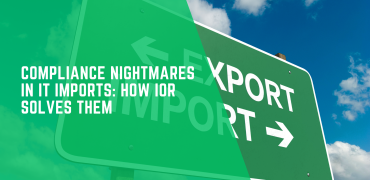International shipping is a complex and multifaceted process that involves navigating a myriad of challenges. From regulatory compliance to logistics and risk management, businesses engaged in global trade must address numerous obstacles to ensure the smooth movement of goods across borders. One key player that can significantly alleviate these challenges is the Importer of Record (IOR). This blog post explores the top challenges in international shipping and how an IOR can help businesses overcome these hurdles.
Understanding International Shipping Challenges
1. Regulatory Compliance
Complex Regulations: Each country has its own set of import regulations, which can be intricate and subject to frequent changes. Ensuring compliance with these varying regulations is a significant challenge for businesses.
Documentation Requirements: Accurate documentation is crucial for customs clearance. Required documents can include commercial invoices, packing lists, certificates of origin, and various permits. Missing or incorrect documentation can lead to delays and penalties.
2. Customs Duties and Taxes
Duty Calculations: Determining the correct amount of duties and taxes to be paid can be complex, especially when dealing with different tariff classifications and valuation methods.
Tariff Changes: Tariffs can change due to trade agreements, political decisions, or economic policies, making it challenging for businesses to keep track and adapt accordingly.
3. Logistics and Transportation
Shipping Delays: Shipping delays can occur due to various factors, such as port congestion, bad weather, or logistical mishaps. Delays can disrupt supply chains and result in additional costs.
Freight Costs: Managing freight costs is a critical aspect of international shipping. Fluctuations in fuel prices, carrier rates, and surcharges can impact the overall cost of shipping.
4. Risk Management
Cargo Damage or Loss: Goods in transit are susceptible to damage or loss due to handling, accidents, or theft. Ensuring proper packaging and choosing reliable carriers are essential to mitigate these risks.
Compliance Risks: Non-compliance with import regulations can lead to fines, penalties, and reputational damage. Businesses must implement robust compliance programs to avoid these risks.
5. Trade Restrictions and Sanctions
Embargoes and Sanctions: Navigating trade restrictions, embargoes, and sanctions imposed by governments can be challenging. Businesses must ensure that their shipments do not violate any international trade laws.
Restricted Goods: Certain goods may be subject to restrictions or require special permits for import. Identifying and obtaining the necessary authorizations for restricted goods is crucial.
How an Importer of Record Can Help
1. Expertise in Regulatory Compliance
An experienced IOR possesses in-depth knowledge of the regulatory requirements of various countries. They stay updated on changes in import regulations and ensure that all necessary documentation is prepared accurately and submitted on time. By leveraging the expertise of an IOR, businesses can navigate complex regulations more effectively, reducing the risk of non-compliance and associated penalties.
2. Efficient Customs Clearance
The IOR is responsible for managing the customs clearance process, ensuring that all duties, taxes, and fees are accurately calculated and paid. This includes classifying goods correctly using the Harmonized System (HS) codes, which determine the applicable duty rates. By handling these tasks, the IOR ensures that goods clear customs smoothly and are delivered to their destination promptly.
3. Streamlined Logistics and Transportation
An IOR can assist with logistics planning and coordination, helping businesses choose the most efficient and cost-effective shipping routes and carriers. They can also manage the documentation required for transportation, reducing the risk of shipping delays. By streamlining logistics, the IOR helps businesses maintain reliable supply chains and minimize disruptions.
4. Comprehensive Risk Management
The IOR plays a critical role in risk management by ensuring compliance with import regulations and implementing measures to protect goods in transit. This includes advising on proper packaging, selecting reputable carriers, and obtaining necessary insurance coverage. By proactively managing risks, the IOR helps businesses avoid costly disruptions and protect their investments.
5. Navigating Trade Restrictions and Sanctions
An IOR is well-versed in international trade laws and can help businesses navigate trade restrictions, embargoes, and sanctions. They ensure that shipments comply with all relevant laws and obtain any necessary permits for restricted goods. By doing so, the IOR helps businesses avoid legal issues and maintain smooth trade operations.
6. Cost Savings and Efficiency
While there are costs associated with using an IOR, the benefits often outweigh the expenses. An experienced IOR can help avoid costly delays, fines, and storage fees, ultimately saving businesses money. Additionally, by handling the complexities of international shipping, the IOR allows businesses to focus on their core activities, enhancing overall efficiency.
Case Study: How an IOR Helped a Business Overcome Shipping Challenges
Background
A mid-sized electronics manufacturer based in the United States was expanding its market to Europe. The company faced several challenges, including navigating the complex European Union (EU) regulations, managing customs duties, and ensuring timely delivery of goods.
Challenges
- Regulatory Compliance: The company was unfamiliar with the EU’s regulatory environment, which included specific product standards and safety requirements.
- Customs Duties: Calculating the correct duties for different EU countries was complex, and any errors could lead to significant financial penalties.
- Logistics Coordination: Ensuring timely delivery of goods across multiple countries required efficient logistics planning and coordination.
Solution
The company engaged an experienced IOR to manage the import process. The IOR’s responsibilities included:
- Regulatory Compliance: The IOR ensured that all products met EU standards and safety requirements. They prepared and submitted all necessary documentation for customs clearance.
- Customs Duties: The IOR accurately calculated duties for each shipment using the correct HS codes, ensuring that all duties and taxes were paid promptly.
- Logistics Coordination: The IOR managed the logistics, coordinating with carriers to ensure timely delivery of goods to various EU countries.
Outcome
With the IOR’s expertise, the company successfully navigated the complex EU regulatory environment, avoided penalties, and ensured timely delivery of their products. This allowed the company to expand its market in Europe efficiently and cost-effectively.
Conclusion
International shipping presents numerous challenges, from regulatory compliance to logistics and risk management. An Importer of Record plays a crucial role in helping businesses overcome these obstacles. By leveraging the expertise of an IOR, businesses can navigate complex regulations, streamline logistics, manage risks, and ensure cost-effective and efficient international shipping operations.
Understanding the critical role of the IOR can empower businesses to better manage their import processes and achieve success in the global marketplace. As international trade continues to evolve, the expertise and functions of the Importer of Record will remain indispensable for smooth and compliant cross-border transactions.




